Cal wins 2023 NCAA Men's Swimming and Diving Title: Post-meet thoughts
We both look back at this meet one last time and toward the near-future of Cal Men's Swimming and Diving
Cal Men’s Swimming and Diving won the program’s 8th NCAA title in 2023, more or less as expected, holding off a strong charge by Pac-12 foes Arizona State. By being the only top-contender school to score points in all 18 swimming events, California Golden Bears were able to win the team title while only touching the wall first in one individual event. It was such a team effort that Cal Diving earned points for the first time in the Dave Durden era! With the latest championship, Durden’s squad has won the NCAA title 6th times (2011, 2012, 2014, 2019, 2022, 2023).
For an event-by-event recap of the meet, you can find our live-updates of the meet, along with race videos from the NCAA YouTube page.
Cal Men’s Swimming and Diving followed the lead of Cal Men’s Water Polo in repeating as NCAA Champion in back-to-back school years. We will find out in about two months if Cal Men’s Rowing can follow suit and repeat as IRA National Champion. Other Cal programs, mainly Women’s Gymnastics and Rugby 15s, are also working hard to win their respective national championships before men’s rowing.
Cal’s individual scorers:
Destin Lasco (JR): 2nd, 200 IM (17) + 3rd, 100 Back (16) + 1st, 200 Back (20) = 53 and 4 relays
Hugo Gonzalez (5Y): 3rd, 200 IM (16) + 2nd, 400 IM (17) + 2nd, 200 Back (17) = 50
Gabriel Jett (SO): 6th, 500 Free (13) + 2nd, 200 Free (17) + 3rd, 200 Fly (16) = 46 and 2 relays
Bjorn Seeliger (JR): 3rd, 50 Free (16) + 10th, 100 Back (7) + 3rd, 100 Free (16) = 39 and 4 relays
Jack Alexy (SO): 6th, 50 Free (13) + 2nd, 100 Free (17) = 30 and 3 relays
Jason Louser (SR): 5th, 400 IM (14) + 6th, 200 Breast (13) = 27
Dare Rose (JR): 4th, 200 Fly (15) + 10th, 100 Fly (7) = 22 and 1 relay
Lucas Henveaux (5Y): 9th, 500 Free (9) + 9th, 1650 Free (9) = 18 and 1 relay
Liam Bell (SR): 6th, 100 Breast (13) + 13th, 50 Free (4) = 17 and 2 relays
Reece Whitley (5Y): 7th, 100 Breast (12) + 16th, 200 Breast (1) = 13 and 1 relay
Colby Mefford (SR): 12th, 200 Back (5) = 5
Joshua Thai (FR): 14th, platform diving (3) = 3
Sebastian Somerset (SR): 16th, 200 Back (1) = 1
Both graduate student Patrick Callan (800 Free Relay) and junior Matthew Jensen (400 Free Relay) swam in point-scoring relays.
Also raced at this meet were junior Dylan Hawk and sophomore Jacob Soderlund.
Congratulations to the entire Cal program, including all of the members of the team who did not get to swim at the national championship!
For the rest of this post, the two of us will share our thoughts on a number of topics.
Ruey Yen:
Destin Lasco vs. Ryan Murphy’s record and then Ryan Murphy at the 2024 US Olympic Swim Trials
While many NCAA records fell at this meet, one that barely remained was Cal legend Ryan Murphy's 200 Back time. Cal junior Destin Lasco, the highest individual point-scorer for the national champ, nearly broke Murphy's record in Bears' lone victory. With 2024 being another Olympic year, Lasco chasing Murphy's record will be one of the interesting subplots of next year. Lasco, repeat NCAA champion in the 200 Back, will also be going for a third consecutive NCAA title in that event.
Training at Cal, Lasco gets to race Ryan Murphy and Hunter Armstrong, who came over to Cal's pro group with Matt Bowe, his previous coach at Ohio State. Murphy and Armstrong are the two best backstrokers in the U.S. and the world right now. At the U.S. Swim Trials, only the top two finishers in the two backstroke events: 100-meter and 200-meter can make the Olympic team. Can Lasco become another U.S. "Calympian" for the Paris 2024 game? With Armstrong being the better sprint backstroker, maybe Lasco can be that second Cal 200m Back guy next to Murphy, following the path of Pebley and Bryce Mefford. Overshadowed by Leon Marchand, Lasco also set the American record in 200y IM at this NCAA meet. He could also be a threat in the 200m IM event next June at the trials.
Reece Whitley and his leadership
The 5th-year Cal Bear helped Cal to win a 3rd NCAA team title (2019, 2022, 2023) to close out a great collegiate career, and he was just 12 points from winning a 4th in 2018. Of the 5th-year student-athlete on the team, only Whitley has been there for all three Cal national championships. Hugo Gonzalez had to sit out the 2019 season after transferring from Auburn.
I was living in Philadelphia in 2018 when I first heard about local star Reece Whitley signing with Cal. Burdened with so much expectation early, Whitley had a great collegiate career even if the breaststroker never became a U.S. Olympian like many had predicted when he was just a tween. Although I did question his inclusion in Cal's 400 Medley Relay, it was very fitting to see captain Reece Whitley leading the Cal team to pick up the NCAA championship trophy. Cal will miss his leadership next year.
Cal Coaching situation
For the second consecutive year, Dave Durden got his former mentor David Marsh to share the sideline with him at the NCAA. Marsh was brought in prior to the NCAA in 2022 to fill in for Chase Kreitler, who was on paternity leave. Kreitler has since been hired as the head coach for both the men and women swimming at Pitt. After the Teri McKeever fiasco, Marsh was brought back as the head associate coach for the women's program for this school year only.
Could Marsh stay for another year to help prepare swimmers, especially the ones in Cal’s pro group, for the 2024 Paris Olympics? While training swimmers at SwimMAC in North Carolina, Marsh was instrumental in getting “Calympians” Kathleen Baker and Anthony Ervin into medalists at the 2016 Rio Games. It is probably too late for Marsh to have impact training swimmers for 2024 Paris outside of the Cal setup. The 64-year-old Marsh might want to coach Olympians for another year.
Replacing Kreitler on Cal’s staff as the official second-in-command was Matt Bowe. Also new on the Cal staff for 2023 was diving coach Pei Lin. The status of these two should be unchanged regardless of how Cal Athletics deal with the women’s swimming team. The promotion of Dave Durden to be the Cal swimming “director” was only for the 2022-23 school year. Cal may or may not want to keep the swimming teams coed going forward.
Chances to Three-peat?
I have no doubt that Cal will be active in trying to add to the team via the transfer portal. The esteemed Cal pro group will be a draw for swimmers with Olympic ambition. Better yet, I hope Cal diving coach Pei Lin adds to the diving squad on both the men's and women’s side via the portal.
Cal may bring Liam Bell back as a 5th-year graduate student. They should prioritize adding another butterfly/sprinter to compete with Dare Rose. Dave Durden will also hope to strike gold again via the portal to fill that distance need after hitting on Lucas Henveaux, though that slot could be penciled in by freshman Matthew Chai. Swedish “Calympian” Robin Hanson took a step back in his sophomore season after qualifying for the NCAA as a freshman. Nonetheless, I can see Hanson rebounding to be another reliable mid-distance swimmer.
At this point, I trust Durden to have his team ready both for the short course yards of the NCAA and the long course meters of the Olympic Games next school year. Cal famously had their top guys, including Ryan Murphy, Josh Prenot, and Jacob Pebley, skipping the Pac-12 championships in lieu of an Olympic course meet in 2016. With a similar strategy, we might know even less about just how good the Cal team will be until the NCAA Championships next March.
Since 2010, Cal has finished either 1st or 2nd at the NCAA. I don’t see why that streak would stop, regardless of how ASU will get better and how Texas will reload. 2022-23 is the 3rd time that Cal Men’s Swimming has repeated as NCAA champion. A three-peat for the first time in program history will just be another achievement for Durden’s group to aim toward in 2024.
Christopher Zheng:
Cal Thoughts:
In back-to-back years, Cal had an impact fifth-year swimmer return to the team after taking the fall semester off. Last year, it was Bryce Mefford coming off his Olympic Games appearance, which usually does result in a longer break than in most years. This year, it was Hugo Gonzalez, who returned to Spain for the fall without a clear indication of whether he would rejoin the team at any point in the semester. Cal was also bolstered by the addition of Belgium swimmer Lucas Henveaux, who provided extra insurance in distance freestyle. Together, they combined for 68 points and a crucial relay leg in the 800-yard freestyle relay. The Bears certainly weren’t the only team to benefit from midseason additions as Arizona State added Zalan Sarkany and Hubert Kos, both of whom are freshmen though.
Cal’s swimming squad has always had its fair share of stars that challenges for individual titles, make multiple A-finals, and put up elite swims on relays. From Ryan Murphy to Andrew Seliskar to Destin Lasco, the Bears have had its shining stars deliver their best with the spotlights. With Bjorn Seeliger, Hugo Gonzalez, and Lasco (combined for 142 points and made up 3 of Cal’s top 4 scorers), the Bears were always in contention to win individual titles even if they just walked away with one. What separates Cal (and Texas in most years) from the rest of the pack is their “elite depth” of swimmers that consistently fills in the 16 final spots.
Equally as important as the existence of the “elite depth” is the development of swimmers on the entire team to take bigger roles in Cal’s quest to hoist the trophy. Gabriel Jett went from scoring 13 points and just 1 finals appearance last year to 46 points this year and 2 huge relay swims. Jack Alexy has improved so much that he forms the best 1-2 sprinting duo in the country and has seriously put himself into contention for an international team. Jason Louser was a stalwart in the 200-yard breaststroke and 400-yard IM. Younger brothers of Cal champions walked away from the championship with some incredibly impactful swims as Colby Mefford dropped nearly 2 seconds in the 100-yard backstroke and finished 12th in the 200-yard backstroke. Michael Jensen swam several individual events, and while he found himself just outside finals positions in all, he delivered when the stage was biggest in the 400-yard freestyle relay with an astonishing 41.12 split on the third leg to nearly run down Florida. Finally, Sebastian Somerset worked his way into a scoring swim in the 200-yard backstroke, and that helped ensure Arizona State wouldn’t have a path in.
What eventually helped Cal develop an advantage over other top contenders was their lack of true weaknesses in their swimming as the Bears scored in every swimming event. However, if the Bears want to continue their streak, they will need to find sprint butterfly and breaststroke options, especially for their relays. Gabriel Jett, as displayed this year, has the speed to swim butterfly on the 400-yard medley relay. Dare Rose was great on the 200-yard medley relay, but he is also better in the longer distances (he’ll also be a senior next year). On breaststroke, if Liam Bell doesn’t return for a fifth year, Cal will be without a scorer in the 100-yard breaststroke and a proven option on both medley relays. Matthew Jensen was the highest-returning scorer in the 100-yard breaststroke, but he will also be a senior next year. For Cal, another potential weakness to monitor is the distance freestyle. With Lucas Henveaux exhausting all his eligibility, the Bears will have to rely on freshman Matthew Chai, who didn’t qualify for the NCAA Championship but has personal best times that would score.
Over the last couple of years, Dave Durden has consistently found impact swimmers from the transfer portal, primarily as graduate transfers (Zach Yeadon, Will Roberts, and Patrick Callan to name a few). Liam Bell came to Cal after one year at Alabama. There are already some names in the transfer portal to monitor such as former star Texas freshman Anthony Grimm. More swimmers will probably enter the transfer portal in the coming day, but it is a sport with one of the lowest transfer rates across the NCAA. Getting a quality breaststroke or butterfly specialists would certainly help the Bears in their quest to a three-peat, but the reality is any swimmer with NCAA scoring potential is valuable given how much the teams in the top six have improved.
3 points. That’s more than 2nd-place Arizona State and 5th-place NC State scored in diving combined. For 14 years, it was also what Cal scored in diving. It’s tied with the total number of points Georgia Tech had in the entire meet, and it’s more than what Air Force, Towson, and Purdue each scored over the weekend. It’s also what freshman diver Joshua Thai scored in his NCAA Championship debut. Thai finished 14th on the platform and 32nd in the 3-meter event. Even without those points, Cal would have clinched the championship before the final relay. But, the implication of Thai scoring is clear: the new facilities plus the addition of an experienced championship diver as the new coach can mean points in the team battle. First-year diving coach Pei Lin has shown some incredible early returns, and if she can successfully guide Thai to score in multiple diving events in the coming years, there’s potential for a burgeoning diving program at Cal.
NCAA Swimming Thoughts:
For the first time since 2013, Texas finished outside the top two. It was pretty evident that the squad lacked the same firepower that they typically have. Part of that came from Anthony Grimm’s retirement (now transfer) and Tim Connery’s transfer to Virginia. Part of it also stems from Drew Kibler choosing not to return for a fifth year and Daniel Krueger, who did return for a fifth year, having an off-year. The Longhorns will also have to deal with the potential graduation of Caspar Corbeau and Jake Foster, but it doesn’t mean that the roster is without talent. Carson Foster continues to be one of the best swimmers in the country. Luke Hobson has established himself as one of the best freestyle specialists in the NCAA. So while it may have been a down year for Texas, they will certainly be back without the need to proclaim it to the rest of the world (sorry Sam Ehlinger).
After their first Pac-12 Championship, Arizona State came into Minnesota with some swagger. Why shouldn’t they? There was genuinely question as to how legitimate of a threat the Sun Devils would be at this meet given that they looked to be shaved and peaked at the conference meet. Leon Marchand finished this meet with the fastest 200-yard IM, 400-yard IM, and 200-yard breaststroke in history. That wasn’t enough as he also swam the fastest relay 50-yard breaststroke, relay 200-yard freestyle, and relay 100-yard breaststroke. In fact, the only swim he had where he didn’t come away as the fastest was the final relay. The Sun Devils also have that “elite depth” in swimmers such as freshman duo Hubert Kos and Owen McDonald, both of whom can legitimately make another jump next year. Their relays (along with Cal and Florida) were the only teams that placed in the top five of all relays. Frankly, if it weren’t for a couple of off-swims on the first prelims, the margin would be even closer (Cal up by 10-25 points instead of 52). Even though they graduate Grant House and have four seniors score, Arizona State will probably be right back in the team battle next year.
This was, by far, one of the most hotly contested battles in the top six. Going into the final relay, Cal and Arizona State had their spots as champion and runner-up cemented. But, for Texas, Indiana, NC State, and Florida, it ultimately came down to how the teams finished in the 400-yard freestyle relay. It has been the Cal and Texas show for so many years, and it seemed like no other team outside of 2013 Michigan could interrupt the duo. It’s clear that the other teams have broken through. Fewer than 120 points separated 1st and 6th place. The gap between 6th and 7th place was 151 points. For context, nearly 200 points separated 1st and 4th in 2022 and 201 points between 2nd and 3rd in 2021. It no longer seems like a certainty that Cal and Texas will be first and second in the upcoming NCAA Championships, but they will certainly always be in the hunt.
Without considering fifth-year eligibility, Cal returns the highest total of individual points of any team in the country. Arizona State’s Leon Marchand is just a sophomore so unless he elects to complete an Olympic redshirt, he will likely return as the no-doubt best swimmer in the NCAA. Florida’s Josh Liendo broke through on the final day of the meet to earn his first individual title, and his times suggest that he’s talented enough to take down Caeleb Dressel’s legendary records. Texas’ Carson Foster has been the model of consistent excellence with nine A-finals, and another year to make it 12-for-12. Each of the top contenders has to deal with graduation/exhausted eligibility and the threat of Olympic redshirts. For Cal, it’s Reece Whitley, Hugo Gonzalez, and Jason Louser. For ASU, it’s Grant House, Jack Dolan, and Leon Marchand. For Texas, it’s Jake Foster, Casper Corbeau, and Daniel Krueger. For Indiana, it’s Andrew Capobianco (diver), Brendan Burns, and Van Mathias. The list goes on.
The top teams will reload and this team battle will be just as close next year. According to SwimSwam’s recruiting rankings, Arizona State, Cal, Florida, NC State, and Texas have a top-ten high school recruit as part of their incoming class. A couple of them are already fast enough to score in the NCAA Championship, and the rest could be there with a year of college weightlifting and training.
The number of international swimmers choosing to participate in NCAA swimming has continually grown, and now, even some of the world’s best are choosing to relocate to train. Leon Marchand (ASU) represents France, Josh Liendo (Florida) represents Canada, Bjorn Seeliger (Cal) represents Sweden, Jordan Crooks (Tennessee) represents the Cayman Islands, Hugo Gonzalez (Cal) represents Spain, Youssef Ramadan (Virginia Tech) represents Egypt, Caspar Corbeau (Texas) represents the Netherlands, and so many more swimmers represent a wide variety of countries. It’s becoming ever more clear that international swimmers are looking for an opportunity to compete in a team battle, and schools are going to need to determine which of the international swimmers are interested because they are more than talented enough to play a big role in the team battle. This upcoming year will be particularly interesting as many elite swimmers will not change their coaches in the run-up to the Olympics, which is evident in South Africa’s Pieter Coetze who has committed to Cal, so most international swimmers likely won’t enroll until after Paris 2024.
ROLL ON YOU BEARS!




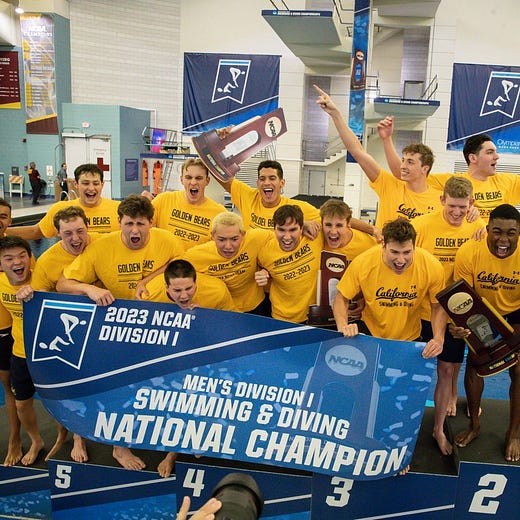
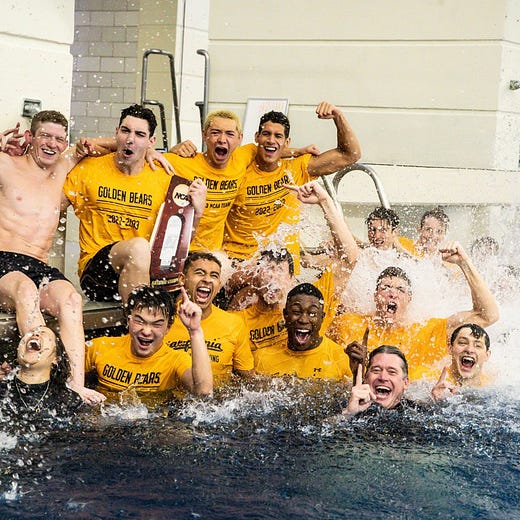
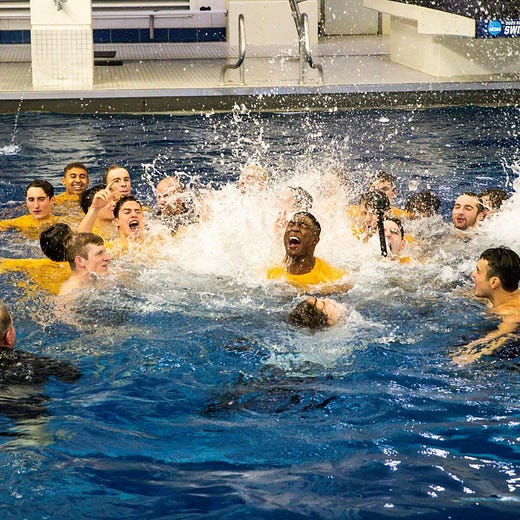
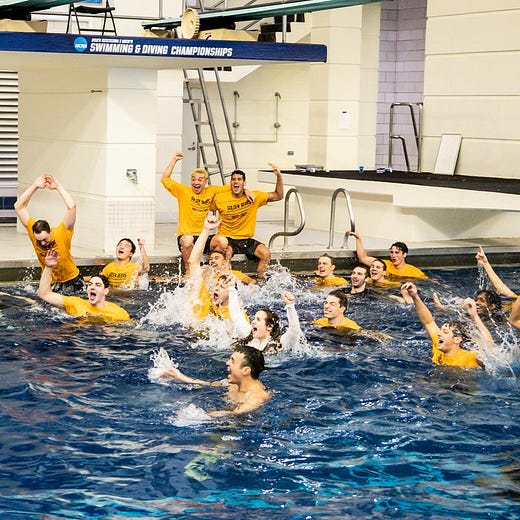


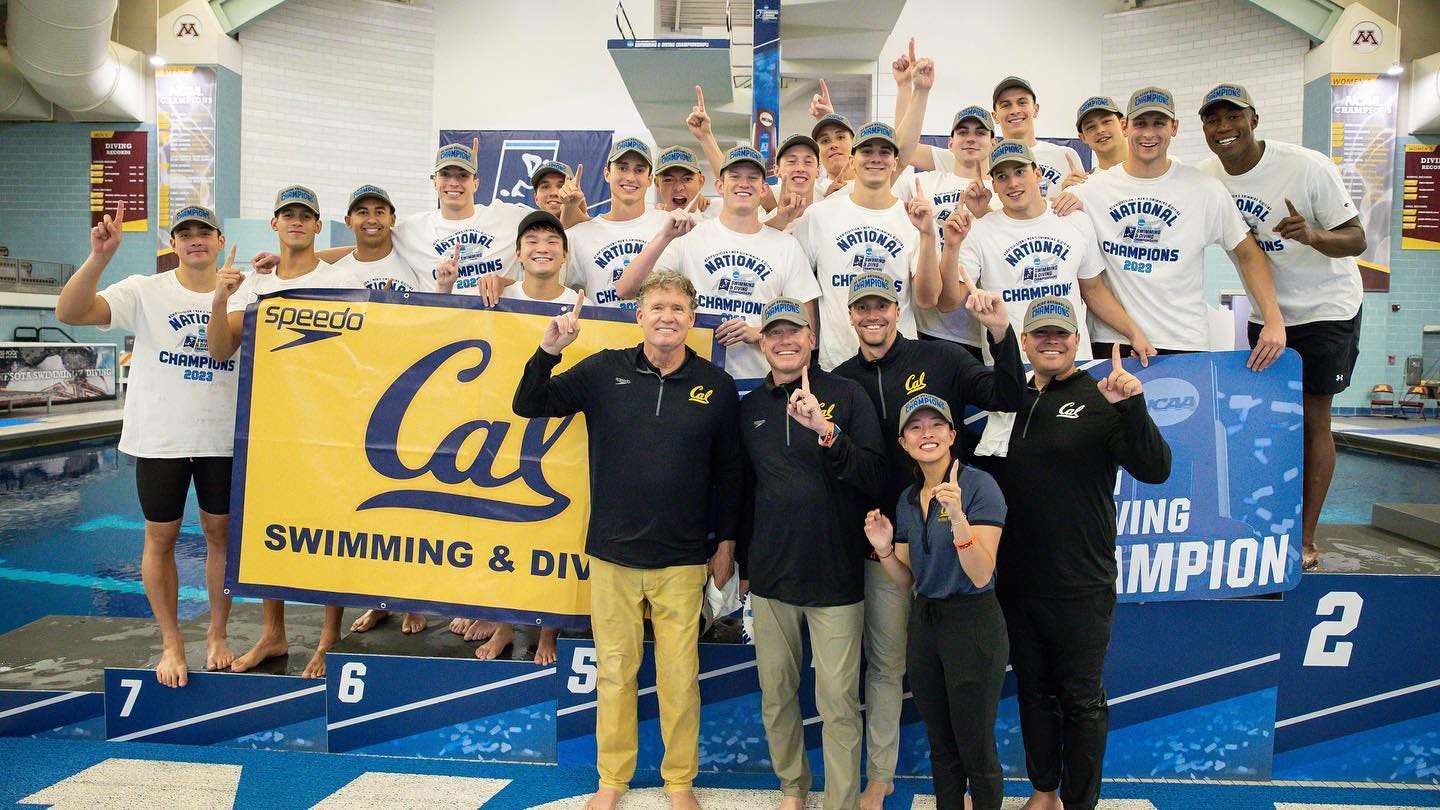

Phenomenal write-up. And I say that as a swim coach AND fan.
Cal fans, what are your thoughts? I’d love to talk more about one of Cal’s most successful programs right now. Share your thoughts, ask your questions, and learn more about swimming!